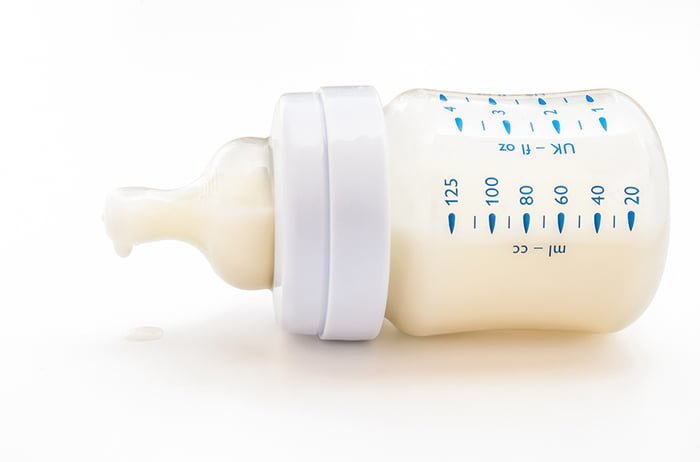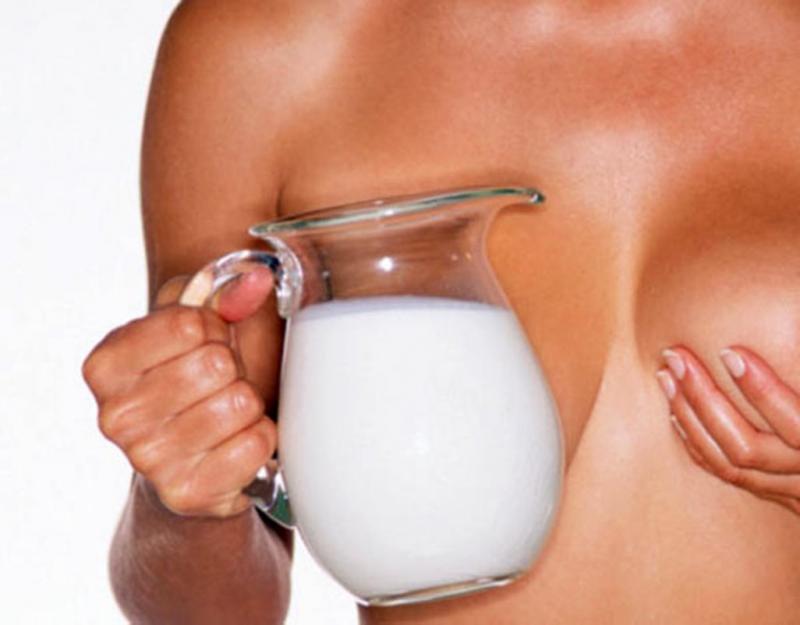What age can be considered optimal for completing lactation?
No one argues about the benefits of breast milk; it is the basis of a baby’s health. Dr. Evgeny Komarovsky advises breastfeeding for at least six months, this will have a positive effect on the formation of the immune system and gastrointestinal tract, and mental development. It is necessary to exclude water, snacks, and feed only milk (of course, if it is available in the required quantities).
After 1 year, breastfeeding can be continued if desired and possible. During the first six months of life, mother's milk can satisfy the need for nutrients, vitamins, and minerals. When breastfeeding, you need to adhere to a special, hypoallergenic, balanced diet; the nursing mother's diet should be rich in proteins, vegetables, grains, and you need to drink more warm liquids.
Mother's milk provides food and drink. The main thing is to breastfeed the baby as much as possible and desire. Even three months is better than completely artificial feeding.
If the mother has decided to end breastfeeding, there is no turning back. Otherwise, excommunication/return may have a negative impact on the baby’s psyche. You can try to remove the HF yourself or contact a specialist. Another option is to feed while milk enters the mammary glands. Health workers believe that long-term feeding is preferable, although it is easier to wean the baby at an early age.
What to do if there is no milk?
Until when can you expect milk to appear? Pediatricians determine this period as 3-5 days after birth. During this period, you can carry out stimulating exercises:
- The baby should be breastfed every two hours;
- There is no need to worry about the lack of milk; in the first 3 days, the baby has enough colostrum. Stress can cause the mammary glands to stop producing milk;
- you should increase the amount of warm liquid consumed;
- It is necessary to exclude any liquid and water from the baby’s diet.
Why breastfeeding is attractive for children after 2 years of age
The liquid becomes more nutritious, fortified, and more antibodies to various diseases and viruses are formed.
After 2 years of feeding, milk contains more calcium, which is so important for the baby. If at one and a half to two years a child goes to kindergarten, eating mother’s milk, it will be easier to resist diseases and viruses. The risk of possible infection from the outside is lower.
If we mention the psychological moment of getting used to kindergarten, then mother’s breast will become a kind of reassurance. The baby will feel protected, this contributes to better adaptation in society.
We recommend reading: How to wean your baby off breastfeeding
Is self-exclusion possible? There are cases when a child, reaching this age, independently refuses to breastfeed.
About the benefits of breast milk
Mother's milk is rightly called white gold. The variety of composition of this product never ceases to amaze. Only mother's milk contains antibodies that protect the child's body from infectious and non-infectious diseases. Breast milk is preceded by colostrum, which contains the entire immune complex. The intake of colostrum into the child’s body is a kind of vaccine against various infections.

To understand the full benefits of this product, you need to familiarize yourself with its composition. The benefits of breast milk are formed by the following components:
- Water. Biologically active liquid is the basic component of breast milk. This liquid is absorbed by the child's body 100%, so if the baby eats only mother's milk, then he does not need additional water.
- Fats. This component replenishes the baby's energy costs. The fats entering the body help strengthen the child’s immunity and ensure the full development of the baby’s central nervous system. In addition, breast milk supplies cholesterol, which is necessary for the production of vitamin D.
- Carbohydrates. Breast milk contains milk sugar (lactose), which stimulates the development of the baby's central nervous system, normalizes intestinal function and ensures the absorption of iron in the body.
- Squirrels. This component is the basis for the full growth and development of the newborn baby’s body. Protein deficiency in the body disrupts the development of the central nervous system and slows down the growth of the entire organism.
- Vitamins and minerals. There are more than 25 types of them in breast milk. Each component ensures the normal course of metabolic processes in the child’s body.
Breastfeeding after 3 years
If it is acceptable to feed a baby with milk up to 2 years of age, then after reaching three years of age, pediatricians do not recommend this type of nutrition. The baby may be very capricious, refuse to sleep until he receives the mother’s breast, and he may have difficulties with social adaptation. A woman may go to work, which may create inconvenience.
Then you should think about shortening the feeding period and stopping breastfeeding. Each mother must make her own decision, but this opinion is based on the experience of specialists.

WHO opinion
The Health Organization considers breastfeeding up to this age to be beneficial. After 1 year of breastfeeding, breastfeeding is recommended in countries with poor ecology and poor sanitary conditions, as breast milk helps the baby cope with intestinal and other infections. In countries with favorable conditions, lactation can be continued for up to 6 months, with the further introduction of complementary foods.
What do American colleagues think?
Pediatricians from the USA believe that up to 6 months the baby should receive everything he needs from his mother’s milk; after six months, complementary foods can be introduced. After 1 year, lactation can be continued at the request of the mother. In the West, one-year-old children are already weaned from their mother's breast.
Weaning problems
When is the best time to wean your baby off breastfeeding? In Soviet times, pediatricians considered the optimal age for weaning to be 1 year. Weaning from breast milk can begin when the baby is mentally and physically ready to switch to solid food.
Early weaning (up to a year) can result in the following troubles:
- The development of the immune system is affected
- The baby is more often capricious, nervous, and asks to be held.
- The baby refuses to sleep alone and often wakes up.
- Psychological aspect: early weaning is perceived by the baby as a loss of connection with the mother, and increased anxiety may develop.
- The baby can suck a hand or finger. In the future, the child may bite his nails and often chew chewing gum.
With late weaning (1.5 - 2 years), the child can already be explained that the mammary gland is not needed, the mother is in pain. The baby begins to act and think more consciously, so weaning will be painless.
We recommend reading: How to wean a child from breastfeeding at 2 years old
How to properly end breastfeeding
It is not recommended to wean your baby in the spring or summer, as the risk of contracting viral colds or intestinal infections increases. Teething is associated with a weakened immune system, so it is best not to start weaning at this time. It is not advisable to refuse breastfeeding during illness or after recent recovery.
The process of completing long-term breastfeeding can be divided into several stages:
- To begin with, they end up with intermediate daily feedings, which do not constitute full feeding.
Often babies ask for their mother's breast during breaks between games and, after sucking for 2-3 minutes, return to the interrupted activity. The mother will have to make an effort to distract the child’s attention, but such attachments have more of a psychological value, so giving them up is usually painless.
- At the second stage, feedings are removed after naps.
If a child wakes up and finds his mother nearby, he will not understand why she denies him the breast. Therefore, women who are accustomed to resting during the daytime with their baby need to get up before he gets up. When the new regime is established, morning application is also abandoned.

- The next step is to avoid breastfeeding before naptime.
It is likely that the baby will be capricious for the first few days and have difficulty falling asleep. The mother needs to try to calm the child down - lie next to him, stroke him, sing a song. If your baby is old enough, try to compromise and explain that milk will only be available in the evening.
- Once the baby has come to terms with the situation, it is time to wean him off feeding before bedtime.
- The last thing to do is remove night breastfeeding.
Usually this stage turns out to be the longest. It sometimes takes several months before your baby completely stops nursing at night.
Problems when weaning from breastfeeding
- Mom must remember that nervous psychosis that leads to tears will soon end.
- Previously, the baby received all the nutrients from milk, now he needs to be provided with the necessary, balanced nutrition.
- To feel protected, the little miracle will ask to be held in your arms more often.
- More time is spent preparing food for the baby.
- The daily routine will change.
- It will take longer to put the baby to bed.
Before weaning, you need to make sure that the child is ready for this:
- baby teeth should erupt;
- the baby must be able to chew solid food;
- the child should be fed 3 times a day, snacks 2-3 times;
- if refused, the baby should be easily distracted by other things (toys, songs); if the child throws a tantrum, blushes heavily, falls to the floor, then it is better to postpone;
- you need to gradually reduce the number of breastfeedings;
- The baby should be able to fall asleep without the mother's participation.
There are several methods of weaning: soft, sharp, medicinal, folk methods.
The gentle method: minimally reduce the number of applications. Gradually remove feeding during the day, then at night, leaving only evening feeding. The disadvantage of this method is the possible hysteria of the baby. The method is preferable, according to child psychology.
A drastic method: reduce the application time, quantity, remove all feedings. The method is suitable for mothers with a small amount of milk and for those whose baby easily refuses milk. Spend more time with the child in your arms, play more, talk more.
You can try giving the baby to the grandmother for a few nights - this will make it easier for the baby to bear the separation if he does not see his mother. This method is not suitable for those children who are strongly attached to their mother or who do not get along with their grandmother.
Medical weaning is equivalent to abrupt weaning - the mother takes a hormonal pill that stops the flow of milk. The milk disappears within two to three days. It is considered unsuitable due to its high hormone content. The tablets have pronounced side effects: nausea, dizziness, weakness, rapid heartbeat. The method is the least preferred due to the unpredictable reaction of the body.
If we consider popular advice, then most often they talk about smearing the mammary glands with mustard, hot sauces, and brilliant greens. These methods are not recommended, as they can provoke allergies or psychological trauma for the baby. After all, the breast used to be tasty, but now it has become spicy and tasteless.
During weaning, it is better to wear closed T-shirts. You should not say the words “you can’t”, “I won’t give” and others, so as not to provoke mental trauma. It’s better to switch attention, sing a song, tell something exciting.
We recommend reading: How to wean a child from breastfeeding at 2 years old

When weaning, it is important to remember:
- Milk is a storehouse of vitamins and nutrients.
- it contains immunoglobulins necessary for the formation of good immunity; it is formed before the age of 6 years.
- The sucking reflex is very necessary for a little person; with its help, a correct, calm psyche is established, the baby experiences less anxiety and worry.
- breast sucking develops the jaw, mouth muscles, correct bite, and brain formation
- Feeding perfectly develops the gastrointestinal tract of the little miracle; it is formed up to three years. Nutrient liquid improves the development of the gastrointestinal tract.
It is not necessary that bottle-fed children will grow up unhealthy or “wrong”; mother’s milk and breastfeeding help the baby to develop “better.”
How to stop latching at night
An hour before bedtime, turn off the lights. Before going to bed, read a fairy tale, give a glass of kefir, buy a cute night light. Many children love their mother's singing. Bathing is a good habit that helps you fall asleep quickly. You should try to place the baby on his own crib, away from his mother, so that he does not smell the milk.
Where to begin
From 6-8 months you can introduce baby curds, yoghurts, and fruit purees. It is better to start feeding cheese and kefir at 10-12 months. Cow's milk should be given at the age of 3, it contains a lot of bacteria, and if you boil it, the beneficial substances will be lost. It is better to wait until the baby grows up and the gastrointestinal tract is established.
It is recommended to wean during the winter and autumn periods - there is no risk of dehydration of the baby. When weaning in the summer, you need to give more water. You need to be completely prepared for this step.

Abrupt weaning can have a bad effect on the baby and the mother. It took a long time to establish a clear diet; the breasts became accustomed to producing fluid at a certain time. To avoid lactostasis and mastitis, you need to express milk yourself, without a breast pump. You can apply a cold compress or cabbage leaf to dissolve the bumps. It is forbidden to tighten the breasts - this can aggravate the process. If necessary, you should contact a mammologist. Lactation will go away completely a year after stopping feeding, at which time a small amount of colostrum will be released.
Gentle weaning is preferable; the little miracle will be able to gradually adapt to a new way of life and switch attention to educational, interesting things. Gentle weaning will have a beneficial effect on the psychological background of the baby and mother. There is no need to scold the baby; for him, the breast is still the most important value - it is protection, nutrition, and a way to fall asleep. The experience of breastfeeding for a mother is the most interesting, feminine, and necessary experience.










